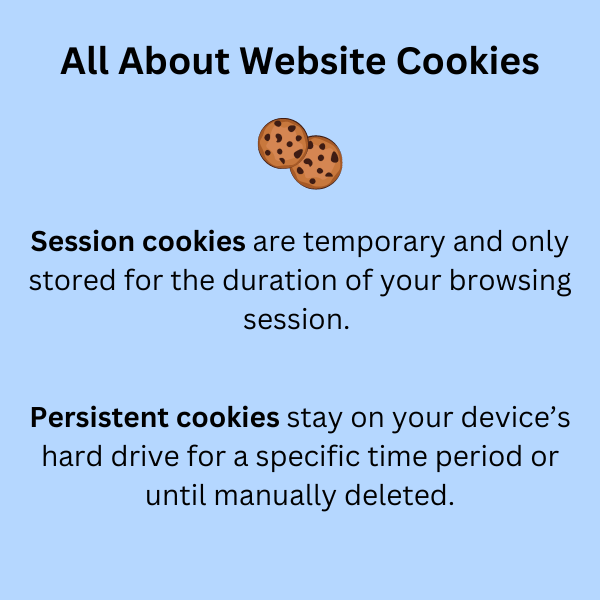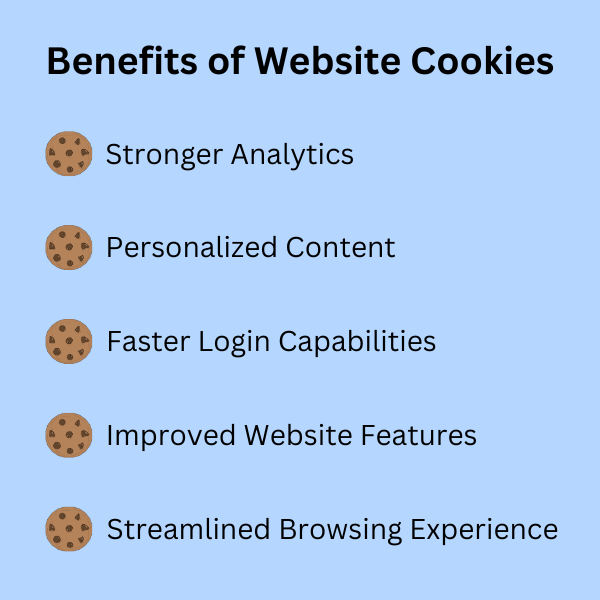It happens so often you probably don’t even think about it: You’re browsing the internet when a message pops up asking for permission to “store cookies” on your device.
So what are these cookies? Why do websites want to collect them? And how can you actually view them on a phone, tablet, or computer? Let’s dive in and demystify it for you.
Defining Cookies: What are Cookies on a Website?
Think of cookies as tiny data packets designed to record and remember information about you, from your login status and preferences to your recent searches. Websites store this information on your device via your web browser.
There are two main types of cookies to know about:
- Session Cookies: These temporary cookies are only stored for the duration of your browser session, handy for maintaining a login as you jump between web pages or keeping items in an online shopping cart. Once you close your browser, the cookies disappear.
- Persistent Cookies: Even after you close a web browser, these cookies stick around on your device’s hard drive for a specific time period (set by each website) or until manually deleted. They remember information (like login details, shipping address, and search filters) across multiple browsing sessions so that you don’t have to reset those preferences each time you access a website.

Why Do Websites Collect Cookies?
Cookies are a central component of a hassle-free experience accessing a website. It’s one of several core reasons websites gather this data:
- Ease of Use. By recalling your past decisions and preferences like language settings, theme choice, or saved shopping carts, cookies streamline your site experience by helping to avoid constant repeat tasks.
- Sustained Authentication. Without cookies, you’d need to enter login information on each new page you open while navigating the same website. Websites collect cookies to eliminate that considerable frustration.
- Analytics Access. Websites use cookies to assess their own performance and understand how users interact with them. Site owners access this data (popular pages, time spent, frequent clicks, and more) and can apply insights to future improvements.
- Targeted Advertising. Cookies track your browsing habits, then show you ads that may interest you. For example, let’s say you just booked a flight to Los Angeles. Later in the week, you’re on a website that shows you an ad for a hotel in the area running a discount during your travel dates. Though some users feel targeted marketing is a bit intrusive, it also supports websites to keep content free and available to the public.
- Enhanced Security. Through their monitoring for suspicious activities on websites, cookies can improve site security by providing safeguards to ensure you are really you.
Benefits of Cookies: Are Cookies Good or Bad?
Turns out, cookies bring website users a lot of benefits we often take for granted. Here’s what’s in it for you when you press that “accept cookies” button:
- Convenience. You don’t need to re-enter your username and password each time you visit a site or click on a new page. Cookies remember those details along with other important preferences.
- Personalization. Websites use cookies to provide a more tailored and seamless user experience. They can recommend products you may enjoy, boost content relevant to your interests, and speed up repetitive form entry processes.
- Functionality. Sites run much more smoothly thanks to cookies that support key features, from online shopping carts to user authentication procedures.
- Performance. Collecting cookies leads to stronger site analytics. Better analytics equips website decision-makers with valuable user behavior data and insights — all of which can be used to improve overall website features and functions.
- Advertising. Sure, sponsored content can get annoying, but you are likely to prefer targeted ads that highlight items and experiences that actually relate to you or pique your interest.

How Can I View Cookies On My Computer Or Other Device?
There’s a relatively straightforward process to see the cookies stored on your device. Here’s how to do so on four popular browsers:
- Google Chrome:
- Open Chrome and click on the three dots in the upper right corner.
- Go to “Settings,” then “Privacy and security.”
- Click on “Cookies and other site data,” then “See all cookies and site data.” You’ll find a list of all the cookies stored on your device.
- Mozilla Firefox:
- Click on the three horizontal lines in the upper-right corner and go to “Settings.”
- Navigate to “Privacy & Security.”
- Under “Cookies and Site Data,” click on “Manage Data” to see the stored cookies.
- Safari (macOS):
- Click on “Safari” in the top menu and select “Preferences.”
- Go to the “Privacy” tab and click on “Manage Website Data.” You’ll see a list of cookies stored on your device.
- Microsoft Edge:
- Click on the three dots in the upper-right corner and go to “Settings.”
- Navigate to “Cookies and site permissions,” then “Manage and delete cookies and site data.” Here, you can view all the cookies.
Conclusion
Cookies might seem like a small detail, but they play a big role in your online experience. They help websites remember who you are, provide personalized content, keep your information secure, and even show you relevant ads.
Now that you know what cookies are, why they’re collected, and how to view them, you can navigate the web with a little more insight and control.
Next time you see a cookie consent pop-up, you’ll know exactly what’s going on behind the scenes!


